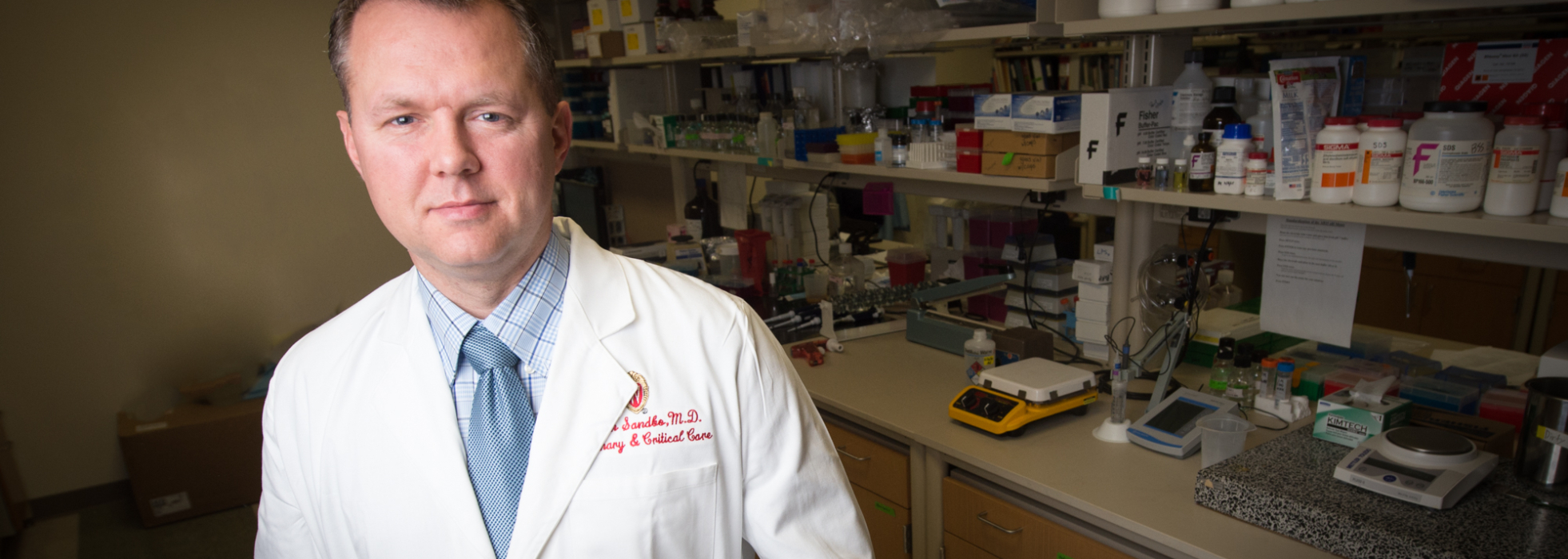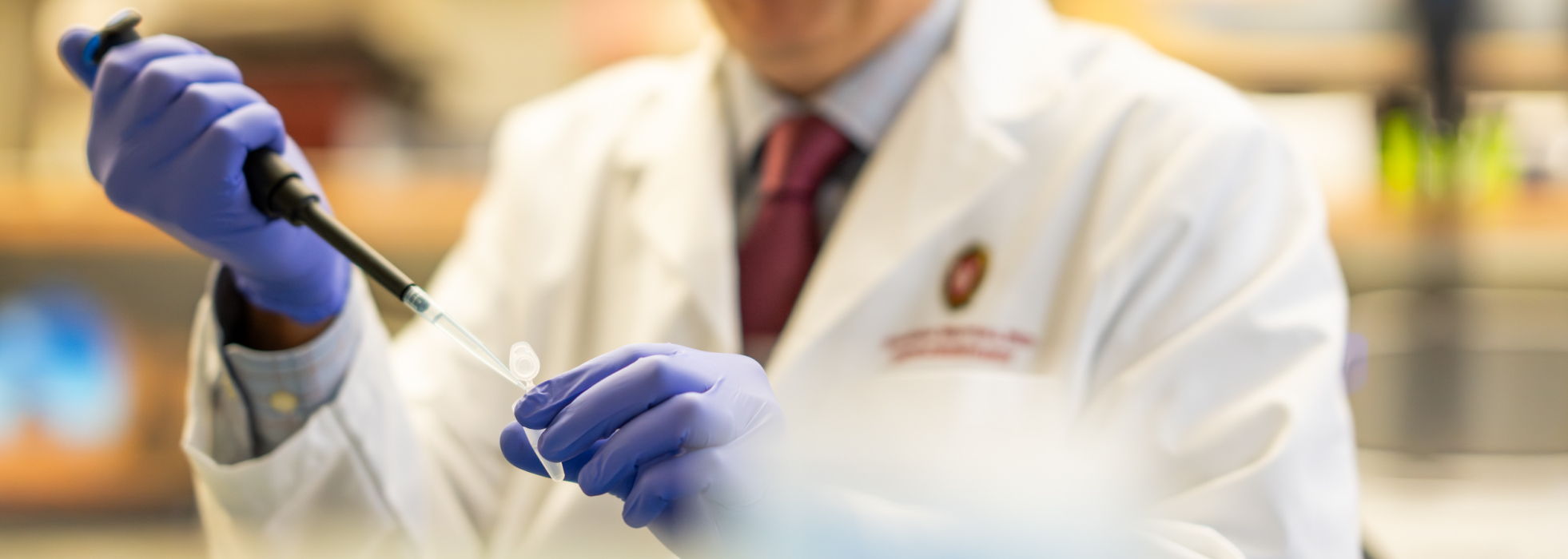Mechanisms of Pulmonary Fibrosis and Fibroblast-Extracellular Matrix Interactions
Nathan Sandbo, MD, is a pulmonologist and critical care physician-scientist with expertise in the diagnosis and management of interstitial lung diseases (ILDs). His research focuses on fibroblast and extracellular matrix biology in the context of tissue remodeling and pulmonary fibrosis.
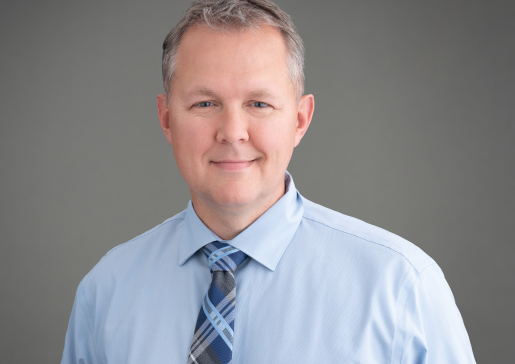
Identifying Ways to Modify Matrix Formation
Fibrotic lung disorders are a difficult-to-treat group of diseases that result in progressive loss of lung function, significantly impact quality of life, and are often fatal.
Dr. Sandbo's lab team aims to elucidate the molecular mechanisms mediating fibroblast activation (myofibroblast differentiation) and extracellular matrix remodeling during pulmonary fibrosis. They use transgenic approaches in the bleomycin pulmonary fibrosis model to accomplish this.
More specifically, their primary area of focus is identifying key molecular mechanisms, peptides, and small molecules that can modify matrix formation during lung fibrosis, with an eye toward developing diagnostics and therapeutics.
Research Team

Research Specialist
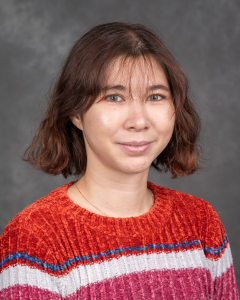
Research Assistant
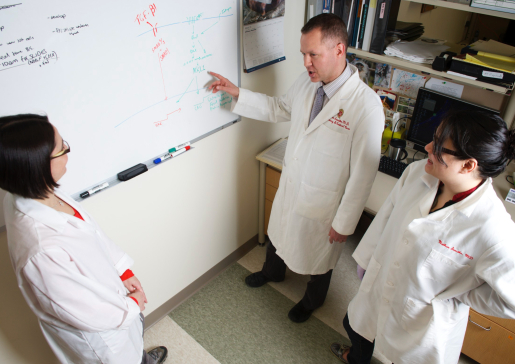
There are opportunities for motivated individuals in the Sandbo Lab! We are currently seeking undergraduates, graduate students and postdocs interested in laboratory research in lung disease using patient samples and animal models.
If you are interested in joining the group, please send your CV and a brief description of your research experience and interests to Dr. Sandbo.
Active Projects
- Elucidating Tensin1-Associated Signals That Promote Fibronectin Matrix Assembly and Lung Fibrosis
This project aims to determine how tensin 1 (TNS1) modifies lung injury, matrix assembly, and the fibrotic response in vivousing global and lineage-specific genetic deletion in murine models of injury and fibrosis.
It also aims to identify key signaling pathways that interact with tensin1 and may be amenable to therapeutic targeting.
- Development of a Pegylated FN-Targeting Peptide as a Therapeutic and Diagnostic for Pulmonary Fibrosis
This project seeks to determine the efficacy of PEG-FUD in disrupting ECM deposition and promoting resolution of pulmonary fibrosis and determine the temporal uptake and localization of 20kD PEG-FUD to areas of active fibrosis in vivo. This work is done in collaboration with Glen Kwon, PhD, at the UW School of Pharmacy.
- Smart Nanoparticles Targeting the Myofibroblast Epigenome for First-In-Class Treatment of Idiopathic Pulmonary Fibrosis
Funded as a Falk Medical Trust Transformational Award, this project seeks to develop IPF treatment through BRD4-targeted aerosolized nanoparticles that will reverse myofibroblast activation and fibrosis in small airways. This work is done in collaboration with Allan Brasier, MD, in the UW Department of Medicine's Division of Endocrinology, Diabetes and Metabolism; and Seungpyo Hong, PhD, at the UW School of Pharmacy.
- Investigation of Aberrant Collagen Organization in Ipf and Its Effect on Fibroblast Activation
This project is a collaboration with Paul Campagnola, PhD, at the University of Wisconsin College of Engineering's Department of Biomedical Engineering.
- Hexosamine Biosynthetic Pathway in Idiopathic Pulmonary Fibrosis
This project seeks to examine the model by which epithelial injury reprograms the hexosamine biosynthetic pathway, leading to restructuring of the extracellular matrix. This work is a collaboration with Allan Brasier, MD, in the UW Department of Medicine's Division of Endocrinology, Diabetes and Metabolism; and Paul Campagnola, PhD, at the University of Wisconsin College of Engineering's Department of Biomedical Engineering.
- Determination of Airway Eosinophil-Driven Effects on Fibroblast Activation in the Asthmatic Airway
This work is a collaboration with Nizar Jarjour, MD, and Stephane Esnault, PhD, in the UW Department of Medicine's Division of Allergy, Pulmonary, and Critical Care Medicine.
Funding Support
Dr. Sandbo’s research is funded by the National Institutes of Health/National Heart, Lung and Blood Institute, the Department of Defense, the National Science Foundation, the Wisconsin Partnership Program Collaborative Health Sciences Program, and The Falk Medical Research Trust.
